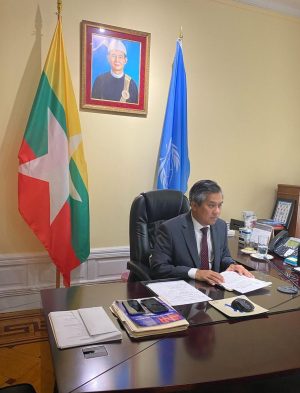Late last week, the disturbing news broke that U.S. authorities had arrested two Myanmar citizens for allegedly plotting to “seriously injure or kill” the country’s pro-democracy ambassador to the United Nations.
In a statement Friday, U.S. Attorney’s Office for the Southern District of New York said that the detained men, Phyo Hein Htut and Ye Hein Zaw, plotted to injure Ambassador Kyaw Moe Tun in an attack that was to take place on American soil.
According to court documents filed in a federal court in White Plains, N.Y., a Thailand-based arms dealer who sells weapons to the Myanmar military hired the pair to hurt the ambassador to try to force him to relinquish his post. “If the Ambassador did not step down, then the Arms Dealer proposed that the attackers hired by Htut would kill the Ambassador,” the statement said.
In the statement, NYPD Commissioner Dermot Shea said Phyo Hein Htut and Ye Hein Zaw “reached across borders and oceans in designing a violent plot against an international leader on United States soil.” The two men have been charged with conspiracy to assault and make a violent attack upon a foreign official, which carries a maximum sentence of five years in prison.
Like many Myanmar ambassadors posted abroad, Kyaw Moe Tun has refused to transfer his loyalty to the new military administration that seized power in February. A few weeks later, he gave an emotional address to the U.N. General Assembly, in which he raised a three-finger salute in solidarity with anti-coup protesters and pledged loyalty to the Committee Representing Pyidaungsu Hluttaw (CRPH), a body set up by lawmakers chosen at last November’s election.
According to the court filing, Phyo Hein Htut “agreed in substance” with the Thailand-based arms dealer on a plan for the former “to hire others to tamper with the tires on the Ambassador’s car to cause a crash while the Ambassador was inside.” Ye Hein Zaw allegedly contacted Phyo Hein Htut by cellphone and transferred approximately $4,000 to him through a money transfer app as an advance payment for the hit.
So far, no proof has surfaced suggesting that the two men were operating at the behest of Myanmar’s military. But the junta has clear interests in forcing Kyaw Moe Tun from his post. It has already attempted to replace Kyaw Moe Tun from his post and replace him with his deputy, but the world body has not taken any action to approve the appointment, setting up a diplomatic struggle when the UNGA’s nine-member Credentials Committee meets next month.
Meanwhile, Kyaw Moe Tun has been one of the most credible and outspoken international spokespersons for the opposition forces grouped around the shadow National Unity Government (NUG). He has spoken widely with the international press, and in June, he voted in favor of a United Nations General Assembly resolution formally condemning the February 1 coup, calling for the return of a democratic government in Myanmar and urging “all Member States to prevent the flow of arms into Myanmar.”
While the Myanmar military regime has few international friends, the plot to injure or assassinate a diplomat on foreign soil will see its legitimacy fall to an even lower ebb. Even if the junta had nothing to do with this plot – and it stretches credibility that it could have taken place without its knowledge – it underlines both the cruel reality of the Tatmadaw’s modus operandi and the legitimacy of its intended victim.
Foreign governments remain unlikely to accord official diplomatic recognition of Myanmar’s opposition National Unity Government. But with each day that passes, it becomes more likely that Myanmar’s U.N. seat will continue to be occupied by Kyaw Moe Tun, who enjoys the twin benefits of incumbency and political legitimacy in the eyes of much of the world.

































